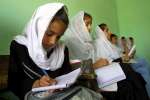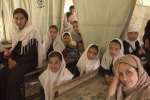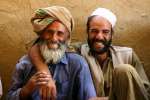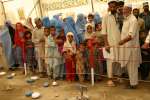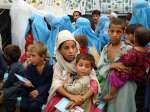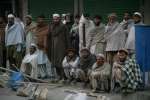- Text size
 |
|  |
|  |
| 
- عربي
16 Days of Activism: Afghan girl embraces new beginning after escaping forced marriage
News Stories, 5 December 2014
ISLAMABAD, Pakistan, December 5 (UNHCR) – When her abusive, drug addict father told Zakia* that she must marry a man twice her age, the then 15-year-old was despondent. But after the Afghan refugee protested, she was barred from leaving the family home in the northern Pakistan city of Peshawar, threatened and severely beaten by her brothers, leaving her with scars as a permanent reminder. She had two options: marry the older stranger or run away.
She chose the second, much riskier option – young girls have been killed for doing the same, despite laws against the practice of child marriage. Zakia was fortunate, she ran to her Pakistani employer, who took her to the UNHCR office in Peshawar.
The refugee agency takes the issue very seriously and has adopted the eradication of child marriage as its theme for this year's 16 Days of Activism against Sexual and Gender-Based Violence, which began on November 25 and ends on December 10. Because she faced a risk to her life, UNHCR moved her to safe accommodation in Islamabad and recommended her for resettlement. She flew to the United States almost a month ago.
But the pain of her youth will always remain with Zakia, who was born and raised in extreme poverty in Peshawar after her parents fled to Pakistan from eastern Afghanistan's Kunar province.
Her mother struggled to feed her 14 children, receiving no help from her husband, who needed money to feed his addiction for cocaine and heroin. "There were days when we had to beg for food on the streets because my father would steal all the money from my mother," recalled Zakia, tears rolling down her face. "I wondered why I should be labelled for the sins of my father," she added.
The money that he took was earned by the older girls, including Zakia, who started working at odd jobs aged just 11 years. Her brothers were as lazy as their father. She eventually secured a house-keeping and cleaning job for a kindly local woman. Back home, all the money that Zakia and her sisters brought in was snatched by her father. "When my mother refused to give him the money, he would brutally beat her and call her bad names."
But worse was to come. About a year ago, Zakia returned home from work to be told by a younger sister that her father and uncle planned to marry her off to a man back in Afghanistan. "They planned to send me to Kunar with my uncle and, once there, I would be handed over to the man for a fixed price," she explained.
But she refused, prompting the fury of the two older men. "My uncle said, 'I will not be the son of my father if I leave Pakistan without taking you with me.' I told him, 'I will not be the daughter of my father if I surrender before you.'"
Scared for her future, Zakia left the family house. Before she was moved to Islamabad ahead of resettlement, she secretly met her mother in a Peshawar safe house for the last time. "We talked little and wept a lot – There was nothing to talk about. She did not want me to suffer the same life as she had," Zakia sobbed. "She was happy for me to escape the marriage, but also worried for me."
Alarmingly, Zakia's story is nothing unusual in India, Pakistan and Afghanistan, where marriages under the age of 16 are widespread, especially among poor families. In addition to cultural reasons, other major contributing factors for child marriages are the settling of feuds and to pay off debts. Often, the husbands are much older than the bride and cases like Zakia's occur too often.
Maya Ameratunga, UNHCR's acting representative in Pakistan, said children who had been forcibly displaced were even more vulnerable because of poverty or because parents are worried that single girls could be raped.
"In Pakistan, the ratio of early marriages among Afghan communities is alarmingly high," she noted, while adding: "What makes humanitarian intervention more difficult to address is the fact that such shameful practices are justified in the name of culture and religion. Early marriage can be a life or death issue for young girls – it's a prime cause of soaring maternal mortality rates in these communities."
Zakia, meanwhile, plans to make the most of the opportunities that life in the United States will give her, starting with getting an education, which until recently seemed an impossible dream. "I will prove to them [her relatives and former neighbours] and to the world that the daughter of a drug addict is as capable of pursuing her dreams as any girl from a privileged background."
Calling for an end to the practice of child marriage, which affects some 15 million girls every year, she urged fathers in Afghanistan and Pakistan not to "play with the lives of your daughters. The money you take [from the groom's family] will finish soon, but the scars on your daughters' souls and bodies will remain for eternity." She urged, instead: "Educate them; make them proud of you, not ashamed of you."
By Duniya Aslam Khan in Islamabad, Pakistan













